
Question Number 202392 by MATHEMATICSAM last updated on 26/Dec/23
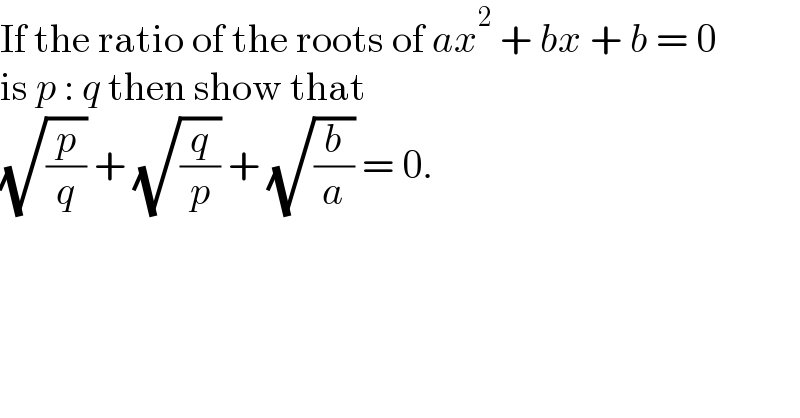
$$\mathrm{If}\:\mathrm{the}\:\mathrm{ratio}\:\mathrm{of}\:\mathrm{the}\:\mathrm{roots}\:\mathrm{of}\:{ax}^{\mathrm{2}} \:+\:{bx}\:+\:{b}\:=\:\mathrm{0} \\ $$$$\mathrm{is}\:{p}\::\:{q}\:\mathrm{then}\:\mathrm{show}\:\mathrm{that} \\ $$$$\sqrt{\frac{{p}}{{q}}}\:+\:\sqrt{\frac{{q}}{{p}}}\:+\:\sqrt{\frac{{b}}{{a}}}\:=\:\mathrm{0}. \\ $$
Commented by MATHEMATICSAM last updated on 26/Dec/23

$$\mathrm{The}\:\mathrm{question}\:\mathrm{is}\:\mathrm{corrected}\:\mathrm{now} \\ $$
Commented by Frix last updated on 27/Dec/23
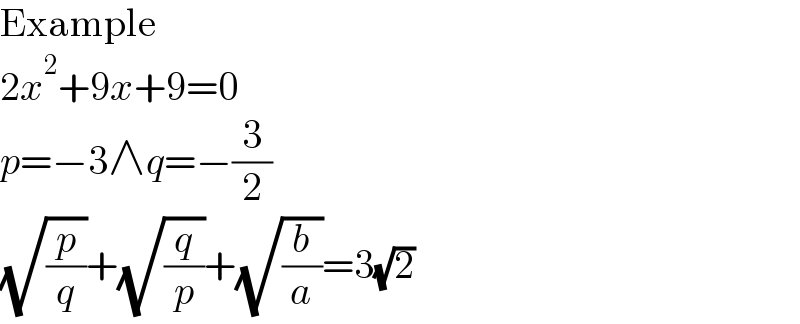
$$\mathrm{Example} \\ $$$$\mathrm{2}{x}^{\mathrm{2}} +\mathrm{9}{x}+\mathrm{9}=\mathrm{0} \\ $$$${p}=−\mathrm{3}\wedge{q}=−\frac{\mathrm{3}}{\mathrm{2}} \\ $$$$\sqrt{\frac{{p}}{{q}}}+\sqrt{\frac{{q}}{{p}}}+\sqrt{\frac{{b}}{{a}}}=\mathrm{3}\sqrt{\mathrm{2}} \\ $$
Commented by MATHEMATICSAM last updated on 27/Dec/23
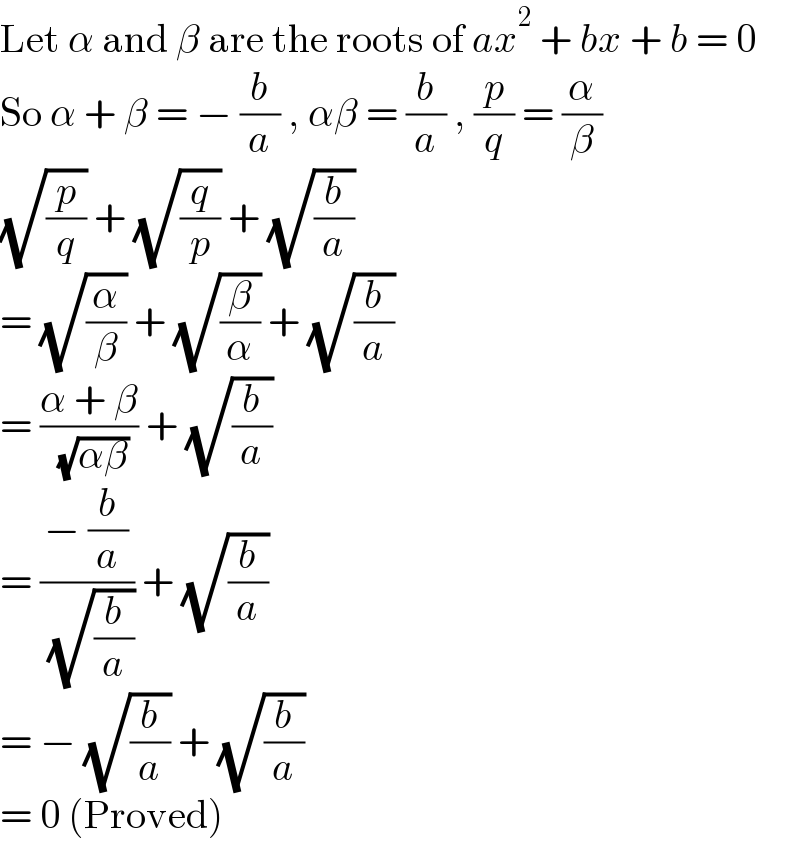
$$\mathrm{Let}\:\alpha\:\mathrm{and}\:\beta\:\mathrm{are}\:\mathrm{the}\:\mathrm{roots}\:\mathrm{of}\:{ax}^{\mathrm{2}} \:+\:{bx}\:+\:{b}\:=\:\mathrm{0} \\ $$$$\mathrm{So}\:\alpha\:+\:\beta\:=\:−\:\frac{{b}}{{a}}\:,\:\alpha\beta\:=\:\frac{{b}}{{a}}\:,\:\frac{{p}}{{q}}\:=\:\frac{\alpha}{\beta} \\ $$$$\sqrt{\frac{{p}}{{q}}}\:+\:\sqrt{\frac{{q}}{{p}}}\:+\:\sqrt{\frac{{b}}{{a}}}\: \\ $$$$=\:\sqrt{\frac{\alpha}{\beta}}\:+\:\sqrt{\frac{\beta}{\alpha}}\:+\:\sqrt{\frac{{b}}{{a}}} \\ $$$$=\:\frac{\alpha\:+\:\beta}{\:\sqrt{\alpha\beta}}\:+\:\sqrt{\frac{{b}}{{a}}} \\ $$$$=\:\frac{−\:\frac{{b}}{{a}}}{\:\sqrt{\frac{{b}}{{a}}}}\:+\:\sqrt{\frac{{b}}{{a}}} \\ $$$$=\:−\:\sqrt{\frac{{b}}{{a}}}\:+\:\sqrt{\frac{{b}}{{a}}} \\ $$$$=\:\mathrm{0}\:\left(\mathrm{Proved}\right) \\ $$
Commented by MATHEMATICSAM last updated on 27/Dec/23

$$\mathrm{not}\:\frac{{c}}{{a}}\:\mathrm{Equation}\:\mathrm{is}\:\mathrm{given}\:{ax}^{\mathrm{2}} \:+\:{bx}\:+\:{b}\:=\:\mathrm{0} \\ $$
Commented by Rasheed.Sindhi last updated on 27/Dec/23
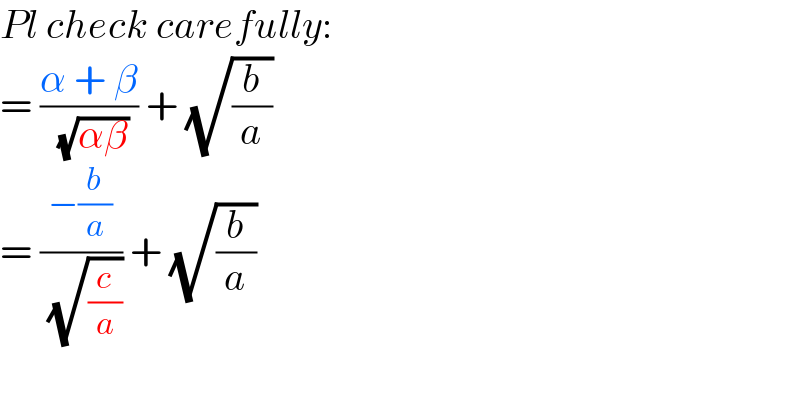
$${Pl}\:{check}\:{carefully}: \\ $$$$=\:\frac{\alpha\:+\:\beta}{\:\sqrt{\alpha\beta}}\:+\:\sqrt{\frac{{b}}{{a}}}\: \\ $$$$=\:\frac{−\frac{{b}}{{a}}}{\:\sqrt{\frac{{c}}{{a}}}}\:+\:\sqrt{\frac{{b}}{{a}}} \\ $$$$ \\ $$
Commented by Rasheed.Sindhi last updated on 27/Dec/23

$${Ok} \\ $$
Commented by Frix last updated on 27/Dec/23
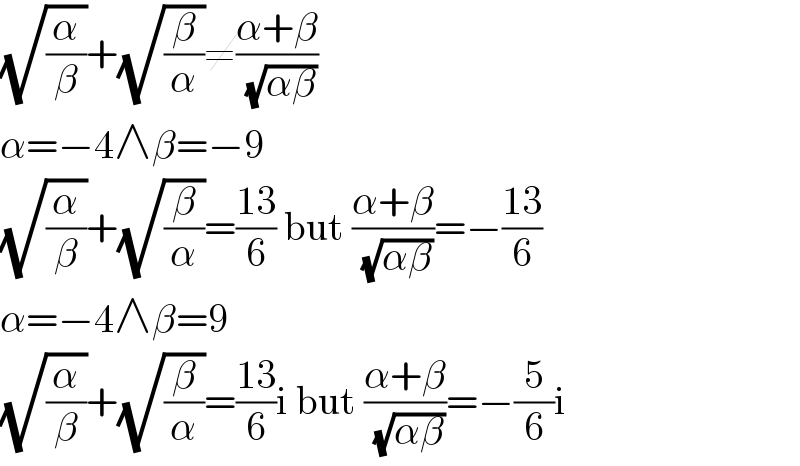
$$\sqrt{\frac{\alpha}{\beta}}+\sqrt{\frac{\beta}{\alpha}}\neq\frac{\alpha+\beta}{\:\sqrt{\alpha\beta}} \\ $$$$\alpha=−\mathrm{4}\wedge\beta=−\mathrm{9} \\ $$$$\sqrt{\frac{\alpha}{\beta}}+\sqrt{\frac{\beta}{\alpha}}=\frac{\mathrm{13}}{\mathrm{6}}\:\mathrm{but}\:\frac{\alpha+\beta}{\:\sqrt{\alpha\beta}}=−\frac{\mathrm{13}}{\mathrm{6}} \\ $$$$\alpha=−\mathrm{4}\wedge\beta=\mathrm{9} \\ $$$$\sqrt{\frac{\alpha}{\beta}}+\sqrt{\frac{\beta}{\alpha}}=\frac{\mathrm{13}}{\mathrm{6}}\mathrm{i}\:\mathrm{but}\:\frac{\alpha+\beta}{\:\sqrt{\alpha\beta}}=−\frac{\mathrm{5}}{\mathrm{6}}\mathrm{i} \\ $$
Commented by Frix last updated on 27/Dec/23

$$\mathrm{You}\:\mathrm{can}\:\mathrm{ignore}\:\mathrm{this}\:\mathrm{but}\:\mathrm{then}\:\mathrm{it}'\mathrm{s}\:\mathrm{not} \\ $$$$\mathrm{mathematics}. \\ $$
Commented by Rasheed.Sindhi last updated on 27/Dec/23

$$\boldsymbol{\mathrm{Sir}},\:\mathrm{you}'\mathrm{re}\:\mathrm{very}\:\mathrm{right}! \\ $$
Commented by MATHEMATICSAM last updated on 27/Dec/23

$$\mathrm{Hmm}\:\mathrm{right}\:\mathrm{but}\:\mathrm{for}\:\mathrm{this}\:\mathrm{question}\:\mathrm{made} \\ $$$$\mathrm{by}\:\mathrm{basic}\:\mathrm{algebric}\:\mathrm{calculations}\:\mathrm{it}\:\mathrm{is}\:\mathrm{correct}. \\ $$$$\mathrm{Basically}\:\mathrm{for}\:\mathrm{negative}\:\mathrm{numbers}\:\mathrm{the}\:\mathrm{square} \\ $$$$\mathrm{root}\:\mathrm{rules}\:\mathrm{sometimes}\:\mathrm{do}\:\mathrm{not}\:\mathrm{work}. \\ $$
Commented by Frix last updated on 27/Dec/23

$$\mathrm{If}\:\mathrm{it}'\mathrm{s}\:\mathrm{wrong}\:\mathrm{it}'\mathrm{s}\:\mathrm{wrong}. \\ $$$$\mathrm{You}'\mathrm{d}\:\mathrm{have}\:\mathrm{to}\:\mathrm{restrict}\:\mathrm{the}\:\mathrm{values}\:\mathrm{to}\:\mathrm{get} \\ $$$$\mathrm{a}\:\mathrm{valid}\:\mathrm{solution}. \\ $$
Answered by Rasheed.Sindhi last updated on 27/Dec/23
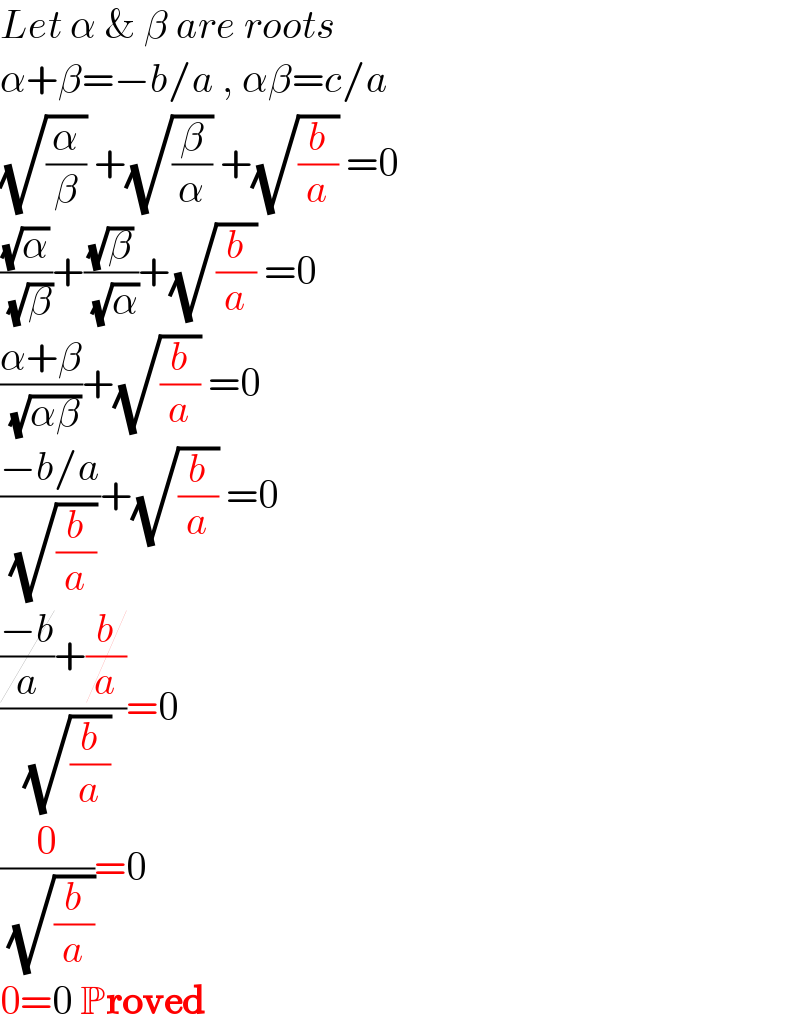
$${Let}\:\alpha\:\&\:\beta\:{are}\:{roots} \\ $$$$\alpha+\beta=−{b}/{a}\:,\:\alpha\beta={c}/{a} \\ $$$$\sqrt{\frac{\alpha}{\beta}}\:+\sqrt{\frac{\beta}{\alpha}}\:+\sqrt{\frac{{b}}{{a}}}\:=\mathrm{0} \\ $$$$\frac{\sqrt{\alpha}}{\:\sqrt{\beta}}+\frac{\sqrt{\beta}}{\:\sqrt{\alpha}}+\sqrt{\frac{{b}}{{a}}}\:=\mathrm{0} \\ $$$$\frac{\alpha+\beta}{\:\sqrt{\alpha\beta}}+\sqrt{\frac{{b}}{{a}}}\:=\mathrm{0} \\ $$$$\frac{−{b}/{a}}{\:\sqrt{\frac{{b}}{{a}}}}+\sqrt{\frac{{b}}{{a}}}\:=\mathrm{0} \\ $$$$\frac{\cancel{\frac{−{b}}{{a}}}+\cancel{\frac{{b}}{{a}}}}{\:\sqrt{\frac{{b}}{{a}}}}=\mathrm{0} \\ $$$$\frac{\mathrm{0}}{\:\sqrt{\frac{{b}}{{a}}}}=\mathrm{0} \\ $$$$\mathrm{0}=\mathrm{0}\:\mathbb{P}\boldsymbol{\mathrm{roved}} \\ $$
Answered by Frix last updated on 26/Dec/23
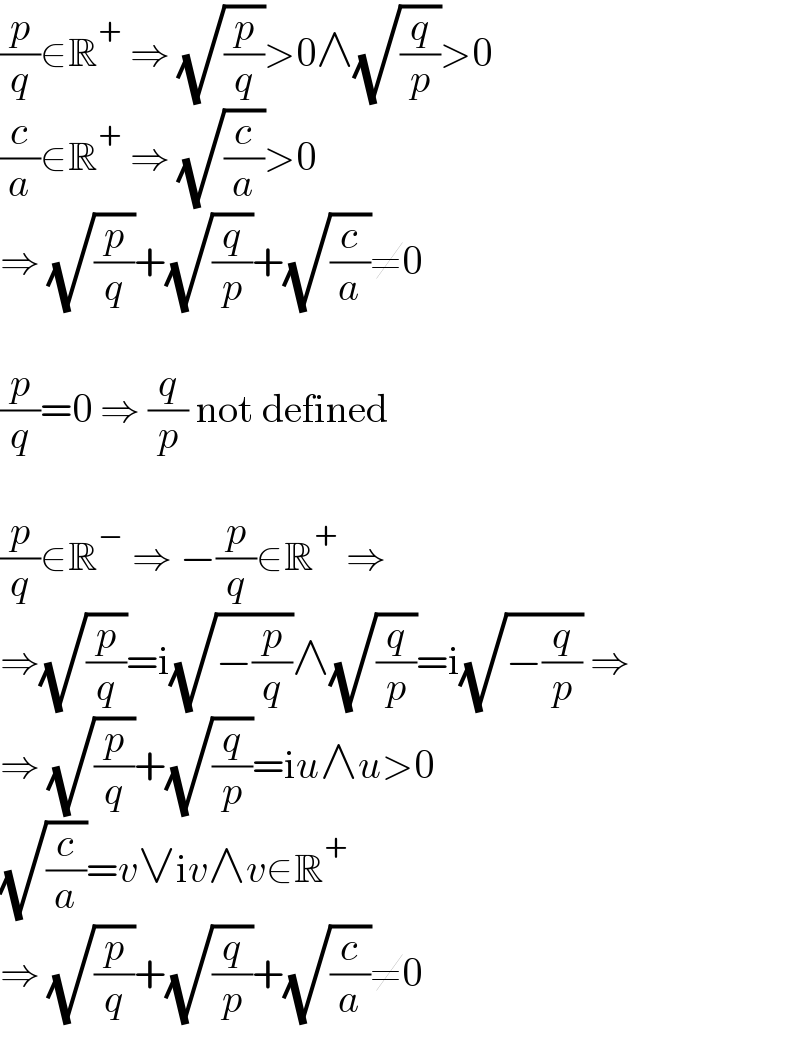
$$\frac{{p}}{{q}}\in\mathbb{R}^{+} \:\Rightarrow\:\sqrt{\frac{{p}}{{q}}}>\mathrm{0}\wedge\sqrt{\frac{{q}}{{p}}}>\mathrm{0} \\ $$$$\frac{{c}}{{a}}\in\mathbb{R}^{+} \:\Rightarrow\:\sqrt{\frac{{c}}{{a}}}>\mathrm{0} \\ $$$$\Rightarrow\:\sqrt{\frac{{p}}{{q}}}+\sqrt{\frac{{q}}{{p}}}+\sqrt{\frac{{c}}{{a}}}\neq\mathrm{0} \\ $$$$ \\ $$$$\frac{{p}}{{q}}=\mathrm{0}\:\Rightarrow\:\frac{{q}}{{p}}\:\mathrm{not}\:\mathrm{defined} \\ $$$$ \\ $$$$\frac{{p}}{{q}}\in\mathbb{R}^{−} \:\Rightarrow\:−\frac{{p}}{{q}}\in\mathbb{R}^{+} \:\Rightarrow\: \\ $$$$\Rightarrow\sqrt{\frac{{p}}{{q}}}=\mathrm{i}\sqrt{−\frac{{p}}{{q}}}\wedge\sqrt{\frac{{q}}{{p}}}=\mathrm{i}\sqrt{−\frac{{q}}{{p}}}\:\Rightarrow \\ $$$$\Rightarrow\:\sqrt{\frac{{p}}{{q}}}+\sqrt{\frac{{q}}{{p}}}=\mathrm{i}{u}\wedge{u}>\mathrm{0} \\ $$$$\sqrt{\frac{{c}}{{a}}}={v}\vee\mathrm{i}{v}\wedge{v}\in\mathbb{R}^{+} \\ $$$$\Rightarrow\:\sqrt{\frac{{p}}{{q}}}+\sqrt{\frac{{q}}{{p}}}+\sqrt{\frac{{c}}{{a}}}\neq\mathrm{0} \\ $$
